| A Lucia to please both eye and ear by Sarah Noble | |
| Donizetti: Lucia di Lammermoor Opera Australia Sydney Opera House 30 July 2008 | |
| Maestro Richard Bonynge conducts with the steady, expert hand to be expected from a man who might just know this opera better than anyone else on the planet. He leads a light, lyrical performance, sensitive always to the needs of his singers. Bonynge's tendency to play it safe might disappoint some - this is a reading as comfortable as the production, relatively free of drastic dynamic extremes or risky innovation - but his bel canto credentials are beyond reproach. Exciting or otherwise, there's no doubting the authenticity of his approach; and if, after several hundred Lucias, he occasionally seems a little blasé in his approach, that's surely understandable. Soprano Emma Matthews, an established darling of Australian audiences, makes a keenly anticipated début in the title role. She could hardly ask for better conditions: a supportive conductor, a theatre packed with adoring fans and music to which her rare agility and pearly tone are ideally suited. Matthews' is a small Lucia, perfectly formed - what she lacks in sheer volume is amply compensated by exquisite, note-perfect singing. Dramatically, she's yet to make the role her own. She clearly revels in the loony antics of the mad scene, but seems unsure of how to portray Lucia's journey to that climactic scene - thus, by the time her Lucia appears, bloodstained and bedraggled, she's done little more than pout dejectedly. But this is not a production dependent upon theatrical credibility; the considerable vocal success which Matthews scores in the role is enough to carry the show. | |
|
The principal trio is backed up by a supporting cast of company stalwarts. Rosemary Gunn's Alisa is a stern duenna, sincerely sung if rather threadbare. Richard Anderson sings with solemnity and careful control as Lucia's tutor, Raimondo, while Graeme Macfarlane is a strong Normanno. Most distinctive is Kanen Breen, clear-voiced and blindingly effete as Arturo, Lucia's bridegroom/victim. The Opera Australia chorus is in strong, unified voice. Copley's staging doesn't require them to do much more than stand around looking concerned, but this they do with aplomb; the unintentionally hilarious Highland dancing at Lucia's wedding is wisely left to the professionals. Resplendent frocks, a handsome set, fabulous singing and just enough blood to keep things interesting - it all adds up to a solid, traditional and enjoyable Lucia, unlikely to devastate, but guaranteed to please both eye and ear. | |
| Text © Sarah Noble Photos © Branco Gaica |
Don Giovanni by Mozart
Director; Elke Neidhardt. Conductor: Mikhail Agrest.
Sydney Opera House, July 5. Tickets: $102-$246.
Bookings: (02) 9318 8200. Until September 10.
DIRECTOR Elke Neidhardt never shies away from taking risks. Whatever you think of the outcome, there's no denying the intellectual rigour and narrative coherence of her creations.
In her new production of Don Giovanni, the action is transferred from the 18th century to a stylised contemporary setting that conveys the universality of the story. The abstract but adaptable set is dominated by black and white hues, with periodic splashes of colour coming from flashing neon signs, washes of orange lighting and the sometimes garish costumes.
Ultimately, though, Neidhardt's dark, sombre vision of Don Giovanni only partially convinces. Addicted to the instant gratifications of sexual promiscuity and sensual pleasure, there's nothing glamorous about Giovanni's lifestyle. He just seems to be going through the motions.
That's fair enough on one level, but we need to believe there's something enjoyable and appealing about it if he is to have the vitality and allure that make him both irresistibly attractive to women and the opera's dominating force.
Unlike some directors, Neidhardt has certainly thought through the logical consequences of her modern adaptation. Superstitious elements are reinvented as cocaine-fuelled hallucinations. Concepts of heaven and hell have become meaningless so the final moralising sextet is removed. Instead, Giovanni's departure leaves the other characters dazed and confused.
There are drawbacks here, too. The central character's refusal to repent draws its power and courage from knowing that eternal damnation follows. Here it is diminished because we don't really sense what its consequences are.
Although Hungarian bass-baritone Gabor Bretz's interpretation of Don Giovanni suited Neidhardt's vision, he lacked the necessary charisma and charm. Vocally, however, he was persuasive, cleverly varying his tone to match the moment: rich and full-voiced when wooing his romantic prey, lighter and more unadorned elsewhere. Even finer was Joshua Bloom's Leporello. Sustaining a burnished, resonant timbre, his singing impressed with its excellent dynamic control, fluid phrasing and superb dexterity while his performance captured his character's cunning and servile resentment.
As Donna Anna, Rachelle Durkin's strong sense of line and bright, piercing tone suited the determined intensity of her character. Catherine Carby's richly coloured singing and passionate acting made for a fiery, feisty Donna Elvira, tormented by her conflicting emotions towards Giovanni. Henry Choo (Don Ottavio), Amy Wilkinson (Zerbina) and Richard Alexander (Masetto) all provided sterling support and the orchestral playing under the direction of Mikhail Agrest was largely stylish and alert.
In spite of its flaws, Neidhardt's production largely overcomes the inherent dangers that lurk in updating an opera. Even if it doesn't stir the emotions, her Don Giovanni stimulates the mind like few other productions have done.
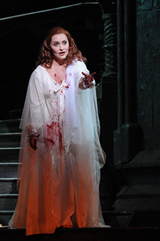 Swords, tartan and leg-of-mutton sleeves abound in John Copley's production of Donizetti's Lucia di Lammermoor for Opera Australia. At twenty-eight years of age, it's one of the oldest productions still in repertory, but it's also something of a classic. Michael Stennett's opulent period costumes and Henry Bardon's imposing architectural features set the scene for a night of good, old-fashioned bel canto - short on drama, but with plenty of heart and enough beautiful singing to gladden the most jaded heart.
Swords, tartan and leg-of-mutton sleeves abound in John Copley's production of Donizetti's Lucia di Lammermoor for Opera Australia. At twenty-eight years of age, it's one of the oldest productions still in repertory, but it's also something of a classic. Michael Stennett's opulent period costumes and Henry Bardon's imposing architectural features set the scene for a night of good, old-fashioned bel canto - short on drama, but with plenty of heart and enough beautiful singing to gladden the most jaded heart. 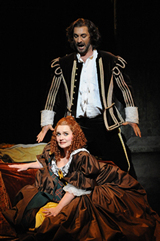 Eric Cutler is a remarkably tender and sweet-toned Edgardo, more lover than fighter, despite his sword-brandishing heroics. His bright and beautiful sound blends wonderfully with Matthews' crystalline Lucia in their Act I duet; his "Tombe degli avi miei" is even more impressive, displaying intelligent phrasing, melting legato and a stunningly controlled upper register. José Carbo is similarly excellent as the other man in Lucia's life, her scheming brother Enrico. Carbo's vivid stage presence brings a dash of individuality to this melodramatic role, making him a cruel but charismatic villain. His rich, muscular baritone is consistently thrilling; the duet with Edgardo in the Wolf's Crag scene is particularly electrifying.
Eric Cutler is a remarkably tender and sweet-toned Edgardo, more lover than fighter, despite his sword-brandishing heroics. His bright and beautiful sound blends wonderfully with Matthews' crystalline Lucia in their Act I duet; his "Tombe degli avi miei" is even more impressive, displaying intelligent phrasing, melting legato and a stunningly controlled upper register. José Carbo is similarly excellent as the other man in Lucia's life, her scheming brother Enrico. Carbo's vivid stage presence brings a dash of individuality to this melodramatic role, making him a cruel but charismatic villain. His rich, muscular baritone is consistently thrilling; the duet with Edgardo in the Wolf's Crag scene is particularly electrifying. 




 Monteverdi’s The Coronation of Poppea is a tale of ambition and manipulation intertwined with love and passion – the perfect recipe for drama. Poppea is a fiery, determined woman who uses her sexuality to secure the throne. Director Kate Cherry draws parallels between Poppea and Paris Hilton - Monteverdi seems to have captured the timeless essence of excess mixed with passion and desire for power.
Monteverdi’s The Coronation of Poppea is a tale of ambition and manipulation intertwined with love and passion – the perfect recipe for drama. Poppea is a fiery, determined woman who uses her sexuality to secure the throne. Director Kate Cherry draws parallels between Poppea and Paris Hilton - Monteverdi seems to have captured the timeless essence of excess mixed with passion and desire for power.
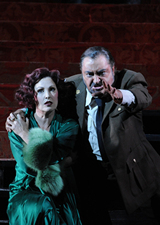 Verdi's Otello is a rare bird. Arguably the composer's finest dramatic opera, it is also one of very few Shakespearean operas to do justice to the Bard. That's thanks partly to a composer as prodigiously gifted in his own field as Shakespeare was in his, and partly to Arrigo Boito's superbly concise adaptation, which removes much of the play's action and several of its characters while losing none of its impact. Stripped to bare essentials, Boito's libretto is a concentrated examination of the precarious personal relationships which are at the play's core. The score is one of Verdi's most extraordinary, his orchestral writing mingling clashing violence with swirling lyricism. Vocal lines are mostly fluid and naturalistic, eschewing the traditional recitative/aria structure, but incorporating several stunning set pieces.
Verdi's Otello is a rare bird. Arguably the composer's finest dramatic opera, it is also one of very few Shakespearean operas to do justice to the Bard. That's thanks partly to a composer as prodigiously gifted in his own field as Shakespeare was in his, and partly to Arrigo Boito's superbly concise adaptation, which removes much of the play's action and several of its characters while losing none of its impact. Stripped to bare essentials, Boito's libretto is a concentrated examination of the precarious personal relationships which are at the play's core. The score is one of Verdi's most extraordinary, his orchestral writing mingling clashing violence with swirling lyricism. Vocal lines are mostly fluid and naturalistic, eschewing the traditional recitative/aria structure, but incorporating several stunning set pieces. 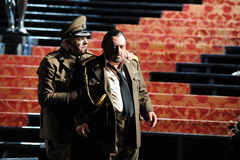 Best of all is Jonathan Summers' diabolical Iago, a figure of inhuman - yet shockingly believable - evil and cruelty. Iago's presence is made all the more unsettling by his army uniform and jackboots; his "Credo in un dio crudel" is delivered with horrifying sincerity and shades of Nuremberg. Summers' slightly threadbare baritone is ideally suited to his purpose, and he manipulates it brilliantly - snarling one moment, smoothly persuasive the next.
Best of all is Jonathan Summers' diabolical Iago, a figure of inhuman - yet shockingly believable - evil and cruelty. Iago's presence is made all the more unsettling by his army uniform and jackboots; his "Credo in un dio crudel" is delivered with horrifying sincerity and shades of Nuremberg. Summers' slightly threadbare baritone is ideally suited to his purpose, and he manipulates it brilliantly - snarling one moment, smoothly persuasive the next. 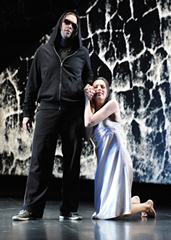 Don Giovanni is Mozart's darkest, most ambiguous work. Comic episodes punctuate a sinister tale of dark deeds and darker consequences; stock opera buffa characters mingle with - and themselves become - villains and victims. Such fascinating complexity invites subversive interpretation, and numerous directors have proved powerless to resist. Most recent to heed that call is Australia's Elke Neidhardt, whose bleak, black 21st century Don Giovanni opened this week in Sydney.
Don Giovanni is Mozart's darkest, most ambiguous work. Comic episodes punctuate a sinister tale of dark deeds and darker consequences; stock opera buffa characters mingle with - and themselves become - villains and victims. Such fascinating complexity invites subversive interpretation, and numerous directors have proved powerless to resist. Most recent to heed that call is Australia's Elke Neidhardt, whose bleak, black 21st century Don Giovanni opened this week in Sydney. 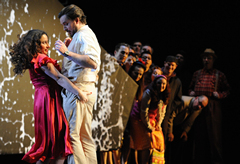 Hungarian bass Gabor Bretz brings rugged self-assurance and a warmly expansive voice to the title role. In manner and in voice, his is a brutish Giovanni, in keeping with Neidhardt's vision; Bretz slides convincingly into character as a present-day bad boy. Narcissism is key - he is most compelling in the manic "Finch'han del vino" and later, in his wretched final scene; moments of suave seduction are less persuasive. Bretz's limelight is very nearly stolen, however, by Joshua Bloom's terrific Leporello. Bloom is the ideal comic foil, providing humour without resorting to pantomime comedy; he's also in magnificent voice, his "Madamina, il catalogo è questo" as mellifluous as it is funny.
Hungarian bass Gabor Bretz brings rugged self-assurance and a warmly expansive voice to the title role. In manner and in voice, his is a brutish Giovanni, in keeping with Neidhardt's vision; Bretz slides convincingly into character as a present-day bad boy. Narcissism is key - he is most compelling in the manic "Finch'han del vino" and later, in his wretched final scene; moments of suave seduction are less persuasive. Bretz's limelight is very nearly stolen, however, by Joshua Bloom's terrific Leporello. Bloom is the ideal comic foil, providing humour without resorting to pantomime comedy; he's also in magnificent voice, his "Madamina, il catalogo è questo" as mellifluous as it is funny. 